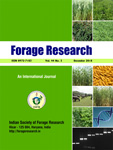NEHA, GAJENDER YADAV*, R. K. YADAV**, ASHWANI KUMAR, A. K. RAI AND JUNYA ONISHI
ICAR–Central Soil Salinity Research Institute, Karnal-132001 (Haryana), India
CCS Haryana Agricultural University, Hisar-125004 (Haryana), India
Japan International Research Center for Agricultural Sciences (JIRCAS), Ohwasi, Tshukuba,
Ibaraki, 305-8686, Japan
*(e-mail : gajender.icar@gmail.com; **RK.Yadav@icar.gov.in)
(Received : 07 January 2022; Accepted : 11 February 2022)
SUMMARY
Soil salinity influences the performance of plants and determines their establishment and distribution. Salinity is regarded as one of the major limiting factors to crop production in arid and semi-arid regions worldwide with more than 6% total land area. Low precipitation, irrigation with saline water, a rising water table, and poor irrigation practices generally cause salinity stress. A double spilt plot lysimeter study was conducted with two replications at ICAR-CSSRI, research farm, Karnal to evaluate Cut-soiler simulated Preferential Shallow Sub surface Drainage (PSSD) effectiveness in salt removal and subsequent effect on growth, yield and forage quality of pearl millet. The study comprised of Cut-soiler PSSD as main plot treatment with two soil types i.e. saline sandy loam and heavy texture soil (sub-plot) and three irrigation water (sub-sub plot) salinity levels (4, 8, 12 dS/m). The Cut-soiler PSSD reduced soil salinity by 49.19 %. The plant height, number of leaves and effective tillers, plant density, green fodder yield, dry matter yield and crude protein content increased significantly under Cut-soiler. Cut-soiler constructed PSSD salt removal resulted in better plant growth and biological, green fodder and dry matter yields. The increment in biological yield was 12.64 %. However, subsequent increase in irrigation water salinity from 4.0 to 8.0 and further to 12 dS/m decreased biological yield by 12.72, 12.20 and 11.41 t/ha, respectively and also caused significant variation on fodder quality parameters. Hence, Cut-soiler PSSD proved beneficial to mitigate adverse effect of salt stress by significantly improving growth and fodder yield and quality traits in pearl millet crop.
Key words: Salinity stress, cut-soiler PSSD, fodder quality, pearl millet [Pennisetum glaucum (L.)]

